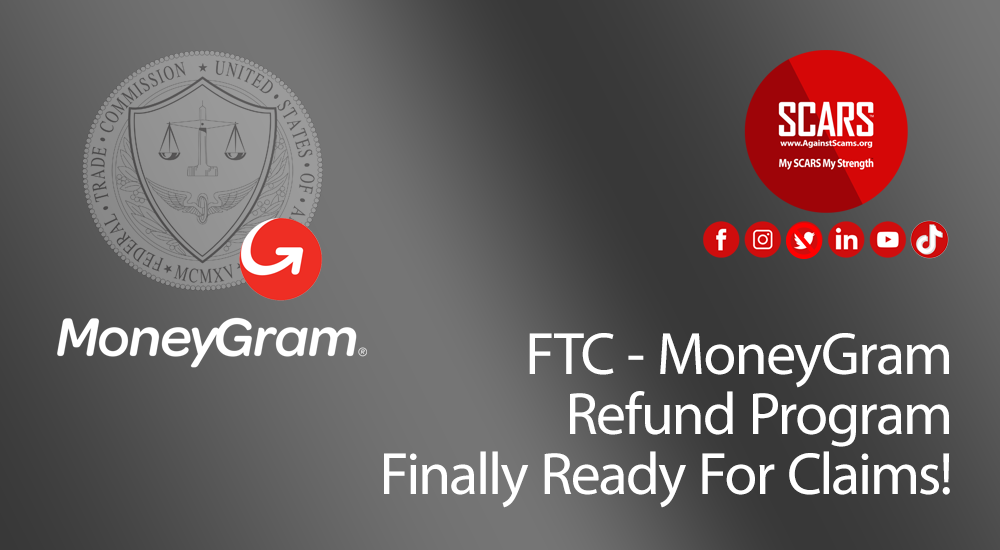U.S. FTC MoneyGram Refund Program Opens To Take Claims
A SCARS Special Report
Finally, After Nearly 4 Years Of Waiting!
However, Pay Attention Because The Time Is VERY Short To Apply For A Refund
Qualifications:
- Sent money via MoneyGram between January 1, 2013 and December 31, 2017
- Any scam victim in any country
If you used MoneyGram to send money to a scammer between January 1, 2013 and December 31, 2017, you may be eligible to file a claim for a refund.
The company handling claims — Gilardi & Co. LLC — is distributing $125 million from MoneyGram’s 2018 settlements with the FTC and the United States Department of Justice (DOJ). In those cases, the FTC and DOJ charged that MoneyGram failed to meet agreements to crack down on consumer fraud involving money transfers.
You’re eligible to file a claim if:
- you sent a MoneyGram transfer to a scammer from the United States between January 1, 2013 and December 31, 2017, and
- you used your name on the money transfer.
THE DEADLINE TO FILE A CLAIM ONLINE OR BY MAIL
is
August 31, 2021
You don’t have to be a US citizen to file a claim.
If you already returned a prefilled form to Gilardi & Co. LLC, you don’t need to file another claim.
If you have not been contacted or previously filed a claim, you can file online, or print the claim form and mail it in with copies of MoneyGram receipts, “send” forms, and transaction history reports.
Do not worry if you do not have all of your receipts – you can file and address the missing receipts later. MoneyGram does have all of these records. The most important thing is to send a claim before the deadline – even if it is incomplete.
The claim form requires you to give your Social Security number (SSN) (for U.S. residents). That’s because the federal Treasury Offset Program must find out whether you owe money to the US government before you can get a payment. It needs your SSN to do that – if you do not live in the U.S. and have a SSN you can use the paper form and submit it by mail.
You don’t have to pay fees to file your claim.
You don’t need a lawyer to file a claim. Don’t pay anyone who contacts you and says they’ll help you file a claim or get your money back.
When you file a claim, you have to give a MoneyGram money transfer control number (MTCN), an eight-digit number assigned to a MoneyGram transfer. It’s listed on MoneyGram receipts and completed “send” forms. If you do not have them, try to provide as much information as possible – remember that if you sent the money online, your MoneyGram account will have those transaction numbers in your account.
For more information about eligibility, the claims process, and other topics, go to ftc.gov/moneygram and moneygramremission.com
-/ 30 /-
What do you think about this?
Please share your thoughts in a comment below!
Do You Need Support?
Get It Now!
SCARS provides the leading Support & Recovery program for relationship scam victims – completely FREE!
Our managed peer support groups allow victims to talk to other survivors and recover in the most experienced environment possible, for as long as they need. Recovery takes as long as it takes – we put no limits on our support!
SCARS is the most trusted support & education provider in the world. Our team is certified in trauma-informed care, grief counseling, and so much more!
To apply to join our groups visit support.AgainstScams.org
We also offer separate support groups for family & friends too.
Become a
SCARS STAR™ Member
SCARS offers memberships in our STAR program, which includes many benefits for a very low annual membership fee!
SCARS STAR Membership benefits include:
- FREE Counseling or Therapy Benefit from our partner BetterHelp.com
- Exclusive members-only content & publications
- Discounts on SCARS Self-Help Books Save
- And more!
To learn more about the SCARS STAR Membership visit membership.AgainstScams.org
To become a SCARS STAR Member right now visit join.AgainstScams.org
To Learn More Also Look At Our Article Catalogs
Scam & Crime Types
More SCARS
- ScamsNOW Magazine – ScamsNOW.com
- ContraEstafas.org
- ScammerPhotos.com
- AnyScam.com – reporting
- AgainstScams.org – SCARS Corporate Website
- SCARS YouTube Video Channel













Leave A Comment